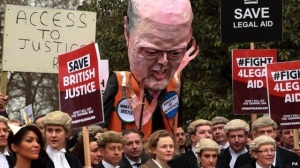DISCLAIMER: This is essentially old news now, though the principle that Legal Aid should not be cut and is a highly important feature of our justice system remains. I wrote this for More Law earlier in the year, so I am posting it here to my personal blog.
Case: R v Scott Crawley and Others (unreported).
The legal aid row has been making headlines recently, with barristers and solicitors protesting in the streets of London, and at courts all over the country. The Conservative-Liberal Democrat coalition had proposed cuts an incredible £220 million pound cut to the £2.2 billion pound legal aid budget; further restricting both who and what type of cases are eligible for legal aid (legal aid has almost ceased to exist in family proceedings). This has created a justice gap.
The Facts
Operation Cotton was an investigation into an alleged fraud. Due to its size and complexity the Legal Aid Authority designated the subsequent trial as a Very High Costs Case (VHCC). Due to a 30% cut in fees paid to barristers who conduct such cases, which has resulted in a decline in those advocates willing to undertake such work, the solicitors defending the accused were unable to find suitably qualified barristers to conduct the case. The Ministry of Justice, through its creation of the Public Defender Service (PDS), had attempted to prevent such an occurrence. The idea was that the PDS could field advocates to undertake such cases. But hardly any barristers joined. As a consequence of these cuts and the inability of the PDS to provide enough advocates of the requisite standard it became clear that the instant case was not going to be trial ready and would have to be adjourned.
The defendants argued that due to the impasse reached over the question of barrister’s fees and the lack of advocates recruited by the PDS the case should be stayed as an abuse of process rather than adjourned. The defendants were represented (for the purpose of this argument) by Alexander Cameron QC (the Prime Minister’s older brother). His Honour Judge Leonard QC granted a stay following Mr Cameron QC’s submission that “it would be unfair to try the defendants if they wished to be represented, and, through no fault of their own, they were not”.
HHJ Leonard QC also noted that the pool of PDS advocates, who it was suggested by some could handle the case, were grossly inadequate and to let them take the case would be manifestly unfair. He said: “I am compelled to conclude that, to allow the State an adjournment to put right its failure to provide the necessary resources to permit a fair trial to take place now amounts to a violation of the process of this court… Even if I am wrong about that, I further find that there is no realistic prospect that sufficient advocates would be available for this case to be tried in January 2015, from any of the sources available to the defence, including the PDS. Whatever reason is put forward by the party applying, the court does not ordinarily grant adjournments on a speculative basis.”
The Court of Appeal
The Financial Conduct Authority appealed His Honour Judge Leonard QC’s ruling to the Court of Appeal. Following submissions the stay was lifted. The judgment handed down on the 21st of May by the President of the Queen’s Bench Division Sir Brian Leveson (sitting with Treacy and Davis LJJ) stated that the time for a stay of proceedings had not yet come. Advocates employed by the Public Defender Service were indeed available, and (in a reactionary measure during the appeal) the Ministry of Justice was actively trying to recruit more PDS adovactes.
The judgment also pointed out that Lord Chancellor Chris Grayling “undeniably” was responsible to sort out the defendant’s representation of the defendants. Sir Brian Leveson, summing up, said “on our analysis, there was a sufficient prospect of a sufficient number of PDS advocates who were then available who would enable a trial to proceed in January 2015. That pool included a sufficient number of advocates of the rank of QC”.
The Political and Legal Significance
This case has shifted responsibility directly to the Ministry of Justice to get their house in order. Even when this case does go to trial, the wider problems within the justice system will remain unsolved. There is a very real and apparent threat to the criminal bar, and to those who appear before the courts.
A long term deal needs to be made between barristers and the government. As Leveson LJ pointed out in his judgment, “it is of fundamental importance that the Ministry of Justice, led by the Lord Chancellor, and the professions continue to try to resolve the impasse that presently stands in the way of the delivery of justice in the most complex cases… The maintenance of a criminal justice system of which we can be proud depends on a sensible resolution.”
The proposed £220 million pound legal aid cuts, and the 30% fee reduction for barristers in VHCCs is something that desperately needs to be solved, not only in the interests of justice, but also to encourage talented young advocates to the Criminal Bar. Unless the Chancellor wants more complex cases such as this to be held up, progress will have to be made, or the most complex cases could go unrepresented, or represented by underqualified advocates.
